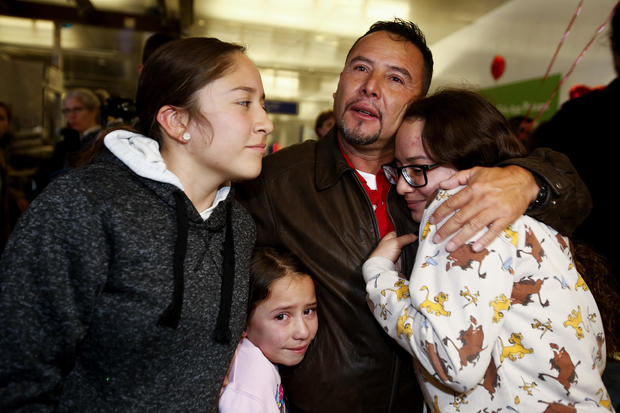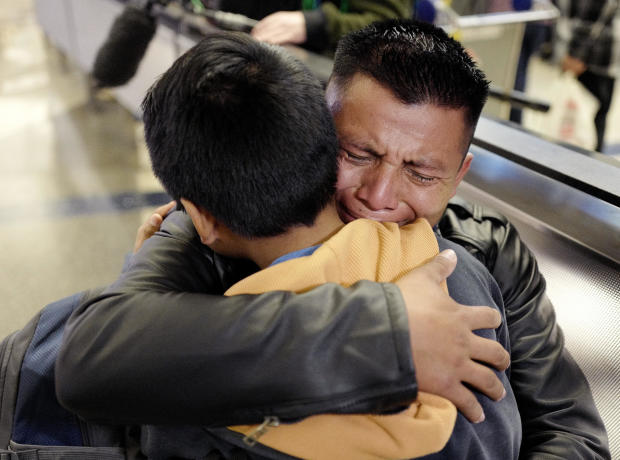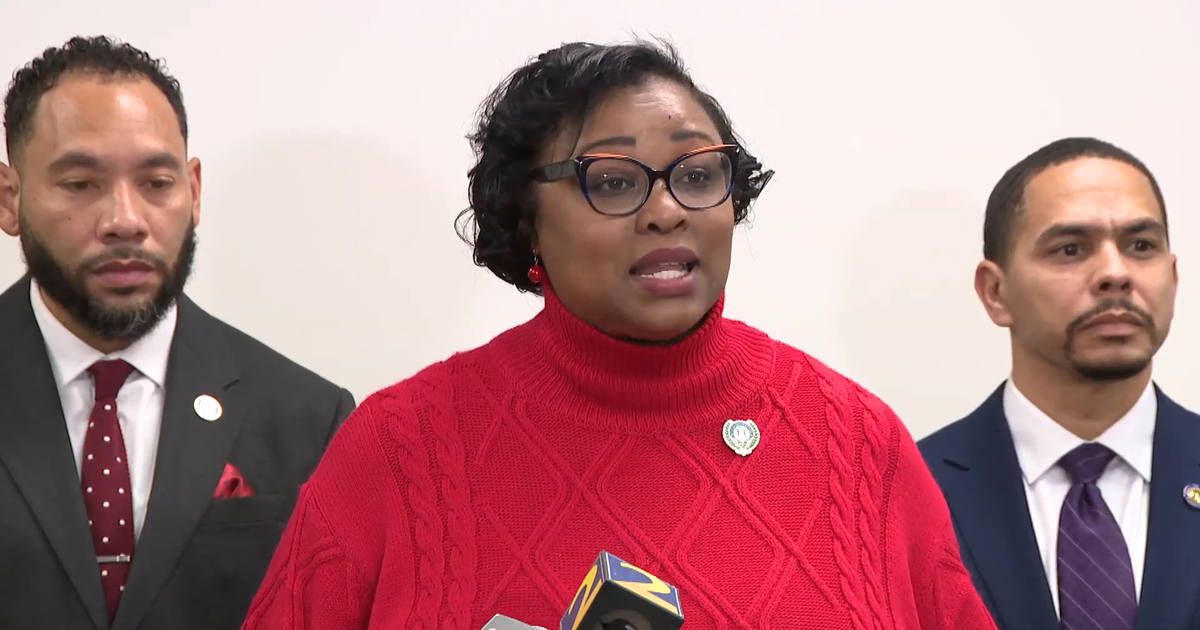Migrant families separated under Trump face elusive quests for reparations under Biden
Fernando Arredondo was fighting both his deportation and suicidal thoughts. He had developed a urinary tract infection and hives, lost eight pounds and fallen into a deep depression.
Arredondo was detained at an Immigration and Customs Enforcement facility in Georgia after being separated from his then 12-year-old daughter Andrea along the U.S.-Mexico border, where they had tried to seek asylum at a port of entry following the murder of his 17-year-old son in their native Guatemala.
"I cried every day. I asked God, 'What's going to happen to me? What's going to happen to my family?'" Arredondo recently told CBS News in Spanish. Like hundreds of other parents, he spent months in U.S. immigration detention before being deported to Guatemala in August 2018 without his family.
Because of a court order, Arredondo was able to return to the U.S. in January 2020 to reunite with Andrea, his wife and their other daughters in Los Angeles, where an immigration judge is reviewing the family's request for asylum. If approved, they will be allowed to live in the U.S. permanently.
But last week, lawyers representing Arredondo and Andrea, now 16, sued the Biden administration, demanding millions of dollars in reparations from the government for their forcible separation and the trauma it caused.
There are now at least 22 pending lawsuits in federal courts across the U.S. on behalf of more than 80 parents and children seeking financial compensation for the trauma they endured after being separated by U.S. border officials during the Trump administration, according to a CBS News review of legal filings.
Last year, the Biden administration agreed to negotiate with lawyers for migrant families seeking reparations to forge a compensation settlement for affected families. But in October 2021, the Wall Street Journal reported that $450,000 payouts were being considered, triggering intense Republican backlash.
Amid the political fallout, the Biden administration in December ended the compensation negotiations. The talks' collapse means families seeking compensation must sue the government to seek damages — if they can find pro-bono lawyers willing to take up their costly and time-consuming cases.
In December, the Justice Department said, "While the parties have been unable to reach a global settlement agreement at this time, we remain committed to engaging with the plaintiffs and to bringing justice to the victims of this abhorrent policy."
But a review of court records and interviews with four attorneys working on these cases show the Justice Department under President Biden has sought to dismiss lawsuits filed by migrant families requesting reparations, and is not settling individual cases to give families compensation it deems just.
Instead, lawyers representing the Biden administration have argued to federal judges that families seeking financial redress over Trump-era border separations are not eligible for compensation under the Federal Tort Claims Act, citing the discretion U.S. officials have over the detention and processing of migrants.
"This discretion necessarily entails decisions regarding with whom noncitizens are detained, including decisions regarding whether adults and minors can be detained in the same facility and whether to detain family members together," the Justice Department wrote in a January request to dismiss a suit on behalf of three migrant families separated in 2018.
That dismissal request was denied on Tuesday by U.S. Magistrate Judge Kandis Westmore, who rejected the Justice Department's arguments and allowed the three families to continue seeking compensation.
"The fact that the Government is now attempting to evade liability for a policy that is still being unwound, as some children are still waiting to be reunited with their families, is not legally defensible," Westmore wrote in her opinion.
The Justice Department declined to comment on these reparation cases or say how it is fulfilling its December pledge of "bringing justice" to families split up during the Trump administration.
"Political double-speak"
Attorneys representing migrant families seeking financial compensation over their separations said the Biden administration should restart global settlement negotiations or seek to settle individual lawsuits.
"Not only would settling these cases on a global basis be the most efficient cost-saving means of proceeding for the government, but it would save the Biden administration from continuing to appear in case after case defending the legality of denying these families a single penny for the brutal harm they suffered," said Lee Gelernt, the American Civil Liberties Union lawyer who challenged the migrant separation policy in 2018.
During a presidential debate in 2020, Mr. Biden forcefully condemned the separation of approximately 4,000 migrant children from their parents during the Trump administration, calling it "criminal."
More than 200 migrant children have been reunited with their parents in the U.S. thanks to a task force Mr. Biden created during his second week in office, according to the Department of Homeland Security (DHS), which estimates that another 1,000 children remain separated from their families.
"Out of those 1,000 children, the Task Force has contacted over 500 parents and nearly 400 children are now in the reunification process," a DHS spokesperson told CBS News this week. "We anticipate these families being reunified and making contact with additional families in the coming months."
In a meeting last summer with families affected by the separations, DHS Secretary Alejandro Mayorkas apologized on behalf of the U.S. government. DHS officials are also asking Congress for $20 million in funds to continue the task force's work and provide additional services to families.
Attorneys noted they appreciate the Biden administration's efforts to reunite separated families, but said the ongoing attempts by the Justice Department to throw out lawsuits filed by parents and children requesting redress for the trauma inflicted upon them by the government tarnish those efforts.
"The government is wrong, morally and legally," said Bree Bernwanger, a Lawyers' Committee for Civil Rights attorney in San Francisco tracking the compensation lawsuits. "They should return to the negotiating table. A failure to do so is engaging in political double-speak. You can't disavow a policy and then defend it in court."
The failure to provide reparations to parents and children who were separated will exacerbate some challenges faced by those who have recently reunited, including housing insecurity, financial instability and scarce access to mental health and medical services, according to two U.S.-based groups assisting them.
Using private donations, the organizations Together and Free and Seneca Family of Agencies said they are offering temporary housing, rental assistance, clothing, case management and other services to about 180 migrant parents and children who recently reunited in the U.S. after separations in 2017 and 2018.
"Only once families have stable housing and food on the table can they really start addressing the trauma and harm caused by family separation," said Kate Wheatcroft, executive director of Together and Free.
A November 2021 qualitative study by Physicians for Human Rights clinicians found that separated families showed signs of severe psychological distress and recommended monetary restitution.
The lawsuit filed on behalf of Arredondo and his daughter Andrea said they both continue to suffer from "severe emotional distress," even after their reunification in early 2020. Arredondo and Andrea have both been diagnosed with post-traumatic stress disorder, according to the lawsuit.
"For any reader of any political stripe, it should shock the conscience that this is what our government did to this family that lawfully approached our country to ask for asylum," said Linda Dakin-Grimm, a pro-bono attorney for the law firm Milbank who filed the lawsuit on behalf of Arredondo and Andrea.
As a policy matter, Republicans have argued against reparations, saying the U.S. should not be giving compensation to migrants who entered the country illegally. Some migrant families, including Arredondo's, were separated after asking for asylum at a port of entry, which is legal under U.S. law.
Arredondo said financial compensation will help his family, especially his young daughters. But he stressed that no amount of money will erase the memories from the day U.S. border agents separated him from Andrea, his months in detention, his deportation and the nearly two-year separation from his family.
It also won't erase the painful reason why his family journeyed north: his son's killing.
"You don't forget it. You don't forget it," Arredondo said, choking up.






